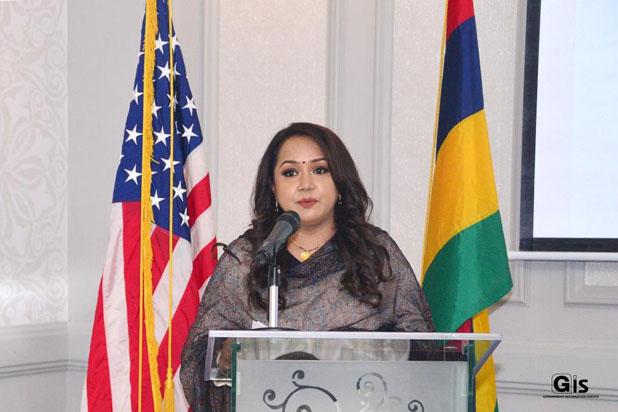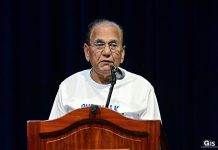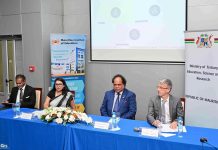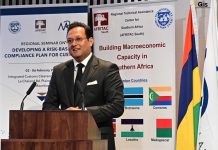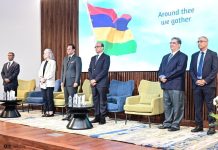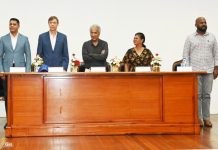Africa-Press – Mauritius. A five-day virtual workshop on Gender Based Violence (GBV) and Human Trafficking, aimed at empowering and enhancing the capabilities of participants from Mauritius on issues related to GBV with focus on providing caring assistance to victims of Human Trafficking, especially sex trafficking, was launched today at the Le Labourdonnais Caudan Waterfront Hotel, in Port-Louis.
The event is organised jointly by the Ministry of Gender Equality and Family Welfare, the US Embassy, the US Africa Command and the US Army. The Minister of Gender Equality and Family Welfare, Mrs Kalpana Devi Koonjoo-Shah, the Acting Deputy Chief of Mission, US Embassy, Mr Thomas D.
Kohl, and other personalities were present during the opening ceremony. Around 28 key stakeholders are participating while seven representatives of NGOs participated virtually including the Departmental Head of Rodrigues and the Commission of Women’s Affairs.
In her address, the Minister recalled that worldwide an estimated one in three women experience physical and sexual abuse in her lifetime and one in every three women has been beaten, coerced in sex or abused in one way or the other and the tragedy is that very often it is by somebody that she knows.
The risk of GBV against women and girls has been amplified worldwide during the COVID-19 pandemic, she indicated. According to her, not only the risk but the spectrum of violence being perpetrated against women and girls has broadened as well and the risk is simply unacceptable.
GVB, remarked Mrs Koonjoo-Shah, which includes but is not limited to domestic violence, sexual violence, child marriage and human trafficking, is the most extreme form of gender inequality.
The Minister stated that when the phenomenon of forced migration is considered, violence against girls and women is more prevalent and, increases the risk of victims experiencing different types of GBV including but not limited to sexual exploitation and human trafficking.
The Minister opined that this alarming trend calls for closer collaboration among national agencies, Government and civil society for committed urgent actions to better protect women and girls. Our responsibility in combatting GBV in the Republic of Mauritius is being addressed at the highest level of Government, she underscored.
In January 2020, a High-Level Committee on the Elimination of GBV was set up under the chairpersonship of the Prime Minister with a view to addressing the existing gaps at the legislative, institutional and operational levels, she indicated. Subsequently the national strategy and action plan of the High-Level Committee on the for the Elimination of GBV was launched in November last year.
The key elements of this plan, emphasised Minister Koonjoo-Shah, revolve around having a shared understanding of the nature and extent of GBV in Mauritius, the commitment of multiple stakeholders in addressing preventive actions, strengthening of the existing legislative and policy framework, capacity building of stakeholders, and a strong monitoring and evaluation mechanism.
She also highlighted that with a view to providing GBV victims with a means to report cases particularly during the lockdown period, a Mobile App Lespwar (Hope) was launched.
For his part, Mr Kohl, said that both men and women experience GBV but most victims are women and girls. GBV can include intimate partner and family violence, sexual violence and human trafficking, he further indicated.
The task of the present workshop, he emphasised, is to ensure that the victims of human trafficking are not forgotten and that they are provided with appropriate assistance.
The workshop is also important as it highlights the collaborative commitment of the US and Mauritius to combat human trafficking in the Western Indian Ocean and both our countries are resolute in their commitment to end modern day slavery, he pointed out.
Last year the US issued a grant of Rs 21 million to the International Organization for Migration to support a two-year project entitled ‘Improving Trafficking in Persons Referral Outcomes in Comoros and Mauritius’, he further added.


